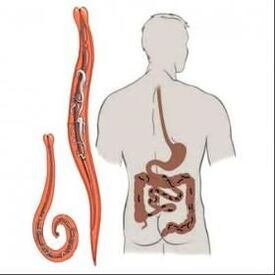Helminthiasis is a group of diseases caused by parasites. Worms can live in human intestines, lungs, gallbladder and bile ducts. Parasites cause mechanical damage to internal organs, and the waste of worms causes poisoning. For humans, helminthiasis is also very dangerous, because it suppresses the immune system, aggravates the progress of other diseases, increases fatigue, decreases intestinal absorption capacity, and reduces the effectiveness of vaccination. You may be infected with worms from drinking dirty water or unwashed food. In rare cases, the disease is spread through the skin or the air.
Worms can live in human intestines, lungs, gallbladder and bile ducts. Parasites cause mechanical damage to internal organs, and the waste of worms causes poisoning. For humans, helminthiasis is also very dangerous, because it suppresses the immune system, aggravates the progress of other diseases, increases fatigue, decreases intestinal absorption capacity, and reduces the effectiveness of vaccination. You may be infected with worms from drinking dirty water or unwashed food. In rare cases, the disease is spread through the skin or the air.
Classification of helminthiasis
By localization:
- intestinal.These include ascariasis, strongyloides, trichomes, nematodes, etc.
- lung.This group includes tominxosis and paragonimiasis.
- organization.This category includes schistosomiasis, trichinosis, toxoplasmosis and filariasis.
- Hepatobiliary system.This group includes mycoplasmosis, fasciasis, and clonorchiasis.
By stage:
- sharp.Helminthiasis usually appears 2-4 weeks after infection. Depending on the severity of the worm invasion, signs of helminthiasis are observed from 1 week to several months, and then the disease becomes chronic.
- Chronic.The clinical manifestations of chronic helminthiasis depend on the characteristics of the parasite. In the presence of worms with larval reproduction (filariasis or strongyloidosis), allergic manifestations can last a long time. In other forms of disease, the symptoms depend on the number, size, and location of the parasites in the body.
Helminthiasis and micronutrient deficiencies
After settled in the human body, the parasites feed on blood and tissue fluid and absorb nutrients. In order to grow and reproduce, worms first need trace elements, which leads to a decrease in their content in the body. The consequence of helminthiasis may be the lack of the following trace elements:
Zinc deficiency.Causes prostatitis, infertility, dwarfism, hypokeratosis (similar to scabs or scabies), various tumors and many other pathologies.
Selenium deficiency.It leads to a decrease in immunity and can lead to the development of malignant tumors in the gastrointestinal tract, breast and prostate.
Iodine deficiency.It can cause stunted growth, impaired puberty, and poorly developed reproductive organs. Iodine deficiency may lead to mental retardation and even dementia.
Manganese deficiency.It may cause brittle bones, weight loss, seizures, dermatitis and degeneration of the genital tract.
Lack of chromium.Causes fatigue, sugar intolerance (boundary diabetes), growth retardation, and elevated cholesterol levels.
Signs of worm disease
- fever;
- Various skin rashes;
- Facial swelling, conjunctivitis;
- Inflammation of the upper respiratory tract;
- Loose stools
- In children, angina pectoris, lymphadenitis;
- Bronchospasm, lung infiltration, pneumonia;
- Myocarditis;
- hepatitis;
- Meningoencephalitis.
Symptoms of helminthiasis (clinical pictures)
Acute helminthiasis.For this form of worm infection The characteristics of a general allergic reaction are: itchy rash, fever, swollen lymph nodes, muscle and joint pain. Acute helminthiasis often leads to the development of lung syndrome, abdominal pain and indigestion. At the same time, the liver and spleen enlarge, and central nervous system symptoms may appear.
The characteristics of a general allergic reaction are: itchy rash, fever, swollen lymph nodes, muscle and joint pain. Acute helminthiasis often leads to the development of lung syndrome, abdominal pain and indigestion. At the same time, the liver and spleen enlarge, and central nervous system symptoms may appear.
Chronic helminthiasis.In many forms of helminthiasis, the parasitism of several single individuals is carried out without any unpleasant symptoms. The characteristic signs of helminthiasis appear in the presence of large worms (taenia, tapeworms, etc. ). The symptoms depend on the type and location of the parasite. For intestinal helminthiasis, pain, indigestion and neurasthenia syndrome are observed. Ascariasis can cause pancreatitis, obstructive jaundice and intestinal obstruction. Enterobiasis is characterized by itching of the anus at night. Clonorchiasis and posterior clonorchiasis can cause hepatitis, cholangitis of the gallbladder and various diseases of the gastrointestinal tract.
Helminthiasis and infectious diseases
Worm infections increase the risk of infectious diseases. Worms can reduce immunity and weaken the entire body. Therefore, parasites open free channels for microorganisms and viruses to enter human tissues. Helminthiasis can be accompanied by the following infectious diseases.
Toxoplasmosis.It is an infectious disease that affects humans and animals. You can get toxoplasmosis through contaminated blood transfusions, eating foods made from unheated meat or fish, or touching patients' feces. Toxoplasmosis is transmitted from mother to child during development in the uterus. Infection can cause the death of the fetus or spontaneous abortion. In newborns infected with toxoplasmosis, the risk of death is high.
Chlamydia.An infectious disease that occurs in rodents, cats and humans. May be accompanied by fever, rhinitis, conjunctivitis, pneumonia, etc. Affects the visual organs, reproductive system and respiratory system. Chlamydia is transmitted through air droplets, contact, and sexually.
Toxokala.The disease has been observed in humans, pets, and rodents. Toxocar eggs can survive for several months in dry feces. You can get the infection through contact with animal hair or through the soil. The disease is accompanied by severe allergies and visceral lesions.
Diagnosis and treatment of helminthiasis
How to recognize worm disease
The prevention of helminthiasis must first comply with strict hygiene standards. Drinking raw water and eating poorly processed or unfamiliar foods (fish, meat) are unacceptable. Early detection of people infected with parasites also plays an important role in prevention. The diagnosis of helminthiasis is made by identifying the larvae and eggs of the worm. In most cases, they are located in different parts of the gastrointestinal tract, so the most common method is stool analysis.
In some cases, the standard method of diagnosing helminthiasis is ineffective. For example, some parasites do not lay eggs for a long time and therefore cannot be found in the feces. An innovative method allows you to recognize the presence of worms and assess the general condition of the body through the iris of the eye. This method is based on the fact that every organ has a projection on a certain part of the "iris", which transmits information about its state through the visceral center of the brain. Even when the usual worm egg test results are negative, this diagnosis of helminthiasis allows you to detect the parasite.

How to get rid of worm disease
An effective, safe and effective way to eliminate the invasion of worms and replenish the necessary trace elements in the body is the worm drug complex, which can improve the health of several major areas at the same time:
- Improve immunity;
- Normalize metabolism;
- Improve the enzymatic function of stomach, pancreas and intestine;
- Remove allergic signs;
- To normalize gastrointestinal activities, etc.
Anti-parasitic health care program
To eliminate helminthiasis, you need to take a broad-spectrum antiparasitic drug for 3 months. Between admissions each month, you need to rest for 7 days.






































